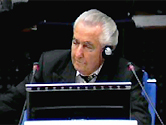 |
|
Ante Marković tells the court what his views were of Slobodan Milošević’s aims and methods: "Milošević said that Bosnia and Herzegovina was an artificial entity created by [former Socialist Federal Republic of Yugoslavia leader Josip Broz] Tito, that it could not survive, and that most of the Muslims were in fact Orthodox who had been forced to change their religion."
"Slobodan Milošević used everything he could to ensure power for himself and power over people. And if that was nationalism, well, then he used nationalism. But in principle, he wasn't a nationalist. He was quite simply somebody who was ready to use everything at his disposal to secure power for himself.
[Milošević] would say one thing and do another. And his acts were different. He would say that he was fighting for Yugoslavia; whereas, in actual fact he was fighting for something different.… He never actually told me, but it was quite obvious that he was fighting for a Greater Serbia."
Ante Marković’s testimony focused on the period March 1989 to December 1991, which coincided with the break-up of the Socialist Federal Republic of Yugoslavia (SFRY). He confirmed in his testimony the Prosecution’s contention that Slobodan Milošević exercised total control over the political apparatus in Serbia, far surpassing the rights bestowed on him by his official function. Marković painted a portrait of an unscrupulous and cool-headed leader, with a proclivity to eliminate political opponents. He showed the ways in which Milošević undermined the federal state, and how he willfully pushed for war by secretly arming Bosnian Serbs, while officially expressing ignorance about the looming conflict, or playing the role of a proponent for peace.
Marković was a political and economic liberal, intent on keeping the SFRY together and shaping it into a Western-style democracy. These convictions put him at loggerheads with Milošević, then President of Serbia. As Marković was determined to stand his ground, the political relationship between the two men was marred by conflict and disagreements.
Marković’s testimony showed that laws and institutions were no obstacle to Milošević’s ambitions. He testified about numerous examples of how Milošević obstructed the SFRY government. As Marković summed up: “Everything that was done from the first day was geared towards making it impossible for the government to function.” This included constant attempts to topple the government by Milošević loyalists in the parliament, and undermining Marković’s reforms to restore the economy. Citing another example, Marković said he was one month late presenting his cabinet because Milosević insisted on placing a man loyal to him as Interior Minister, so he could have control over the intelligence services.
Marković also testified about the determination with which Milosević pursued his quest for power. He organised popular demonstrations in order to replace his opponents, what Marković called “a kind of political lynching”. Marković alleged that Milošević even used the most ruthless of methods to deal with opposition: in October 1991, when he was visiting the Croatian President’s residence in Zagreb, the building was bombed by what Marković claimed were MIG-29 fighter planes that could only have been sent from Belgrade in an attempt to kill him.
As a result of such methods, Marković claimed that in Serbia “absolutely nobody could even have dreamt of doing anything otherwise, contrary to [Milošević]. Everything had to be done as he instructed, according to his instructions and under his control.” Marković maintained that anyone who contradicted Milošević “wouldn't have kept his post for 24 hours”.
Marković’s testimony also supported the Prosecution’s claim that Milošević intended to seize a part of Bosnia and Herzegovina. Marković was one of several witnesses who spoke about a secret meeting between Milošević and Croatian President Franjo Tudjman (whom the prosecution would later name as a co-perpetrator of ethnic cleansing in Bosnia and Herzegovina) in March 1991 at the Karadjordjevo hunting lodge near Belgrade. Marković stated that during his subsequent meetings with the leaders, both of them confirmed to him “that they had agreed to divide up Bosnia and Herzegovina”. Milošević showed indifference to the possibility of war breaking out as a result of this plan. When Marković pressed Milošević, “What if war does break out?” he answered, “Well, then we'll see what we'll do,” and dismissed the whole issue.
However, Milošević then took concrete steps that would eventually lead to war in Bosnia and Herzegovina. Marković informed the Court that in July 1991 the Bosnian Muslim Leader Alija Izetbegović informed him of intercepted phone conversations between Milošević and the Bosnian Serb leader Radovan Karadžić, who would later be indicted by the ICTY. Marković listened to the intercepts, and it became clear to him that Serbs in Bosnia were preparing for war and that Milošević was arming them. “It was evident that Serbian paramilitary units in Bosnia and Herzegovina were being armed,” said Marković. “They were discussing the organisation of armies, the arrival of helicopters, the arrival of a colonel, … and of ammunitions ...”
Marković claimed that Miloševic was a difficult man to work with, that he never said what he thought, and had the propensity to deny even the most blatantly obvious facts. In autumn of 1991, when the Serb shelling of Dubrovnik was all over the media, Marković confronted Milošević about it, and he exclaimed: “Who would be crazy enough to shell Dubrovnik? Dubrovnik isn't being shelled.” In December 1991, when war was looming in Bosnia, Milošević seemed equally oblivious: “Which war? There's no war, nor will there be a war.”
Ante Marković, a businessman, was Director General of a leading Croatian electronic equipment company from 1961 to 1984. He went into Croatian and then Yugoslav politics, before becoming the SFRY’s last Prime Minister from 1989 to 1991. Marković later returned to his business career.
Read Ante Marković's full testimony on 23 October 2003 and on 15 January 2004.

